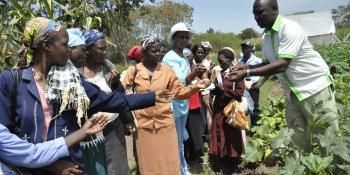Setting priorities for research on agriculture and climate change in Uganda

by Catherine Mungai and John Recha
On 27 March 2012, the CGIAR Research Program on Climate Change, Agriculture and Food Security (CCAFS) East Africa Regional Program and Uganda’s Ministry of Agriculture, Animal Industry and Fisheries (MAAIF) hosted a one-day national planning workshop on climate change and agricultural research in Kampala. The goal of the workshop was to develop a set of priority research areas where CCAFS can engage with the Ministry and other partners. The meeting brought together participants from various ministries, the local government, research institutions and non-governmental organizations.
The threefold objectives of the meeting were to share policy status and options for climate change adaptation and mitigation in agriculture, to identify related research needs and priorities, and to develop action plans for joint activities. In his opening remarks, Mr. Alex Lwakuba, the Assistant Commissioner for Crop Production and Marketing, urged participants to identify sustainable solutions to address the issue of climate change which has social, economic and physical impacts. He added that climate change does pose a major challenge which will compound the poverty situation in the country that could even lead to internal conflict. He commemorated CCAFS and MAAIF for hosting the workshop which created a platform to generate ideas on climate smart agriculture in the face of climate change in the country. He urged participants to consider the role of local innovations and knowledge while developing solutions.
Presentations were made to address specific aspects of climate change as they relate to agriculture and food security. These presentations stimulated reflection and discussion among the participants. They included:
- Status of Climate Change Policies Development, Implementation, NAPA and NAMA in Uganda (Climate Change Unit – Ministry of Water and Environment
- Data Needs and Knowledge Gaps in Climate Information for Agriculture (Department of Meteorology – Ministry of Water and Environment);
- Risk Analysis on Impacts of Climate Change to Agriculture and Food Security in Uganda (MAAIF);
- Agricultural Adaptation Needs and Options for Uganda (National Agricultural Research Laboratories – Kawanda, National Agricultural Research Organization);
- Pro-poor Mitigation Strategies (School of Agricultural Sciences, Makerere University);
- Analyzing Agricultural Policies in Light of Climate Change Mainstreaming (National Agricultural Research Laboratories – Kawanda, National Agricultural Research Organization); and
- Research Priority Setting and Action Plan Development (National Agricultural Research Laboratories – Kawanda, National Agricultural Research Organization).

The participants broke out into six groups to discuss emerging issues after the presentations. Key areas discussed included the status of national policies and priorities concerning climate change, current national information and research needs, existing initiatives and priorities for future engagement. Suggestions for activities included:
- Harmonization of sectoral policies and strategies which address climate change;
- Identification and documentation of local coping strategies and best practices which can be up scaled and also shared with communities facing similar conditions;
- Strengthening the capacity of agro meteorological stations to gather and disseminate relevant climate data;
- Linking indigenous and scientific knowledge to improve weather forecasting and inform climate and agriculture related policies and programmes;
- Exploring agro forestry as an adaptation and mitigation measure and linking with REDD+;
- Exploring the use of ICT and local languages to disseminate climate related information;
- Integration of gender in adaptation and mitigation planning;
- Using crop and pasture simulation models to assess the impacts of climate change from plausible scenarios; and
- Socio-economic studies on people’s adaptive capacity to ascertain the effectiveness of planned interventions.
A major gap identified by the participants was the lack of data to develop nationally appropriate mitigation actions (NAMAs) on agriculture and possible linkages with ongoing REDD+ initiatives. As a way forward, CCAFS will work with MAAIF and other partners like the Climate Change Unit, Department of Meteorology and National Agricultural Research Laboratories – Kawanda, to develop a plan which will prioritize the critical areas for research and identify partnerships to link co-generated knowledge into policy actions.
Read more about CCAFS work in East Africa and the regional activities here.


